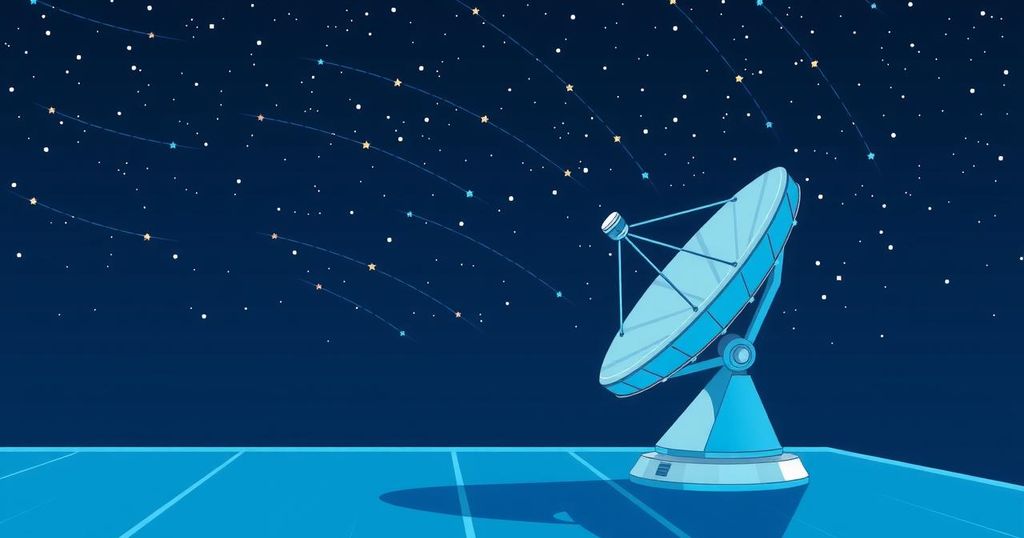Technology
AFRICA, CANADA, CLAY, CLAYSON MONYELA, COMMUNITY ENGAGEMENT, ECONOMIC IMPACT, EL, ELON MUSK, FOREIGN MINISTRY, INDEPENDENT COMMUNICATIONS AUTHORITY OF SOUTH, LEADERSHIP, MICROSOFT, MUSK, NELSON MANDELA, NORTH AMERICA, POLICY, REGULATIONS, SOUTH AFRICA, TECHCENTRAL, US
Leila Ramsay
0 Comments
Elon Musk’s Starlink and the Racially Charged Row Over Operating in South Africa
The conflict over Starlink’s operations in South Africa involves Elon Musk’s claims of racial discrimination versus the country’s black empowerment laws. Musk argues these laws restrict Starlink’s market entry, while government officials clarify that no application has been submitted. The Communications Minister hints at possible regulatory changes, but ongoing political resistance complicates matters, against a backdrop of deteriorating US-South African relations fueled by both Musk’s and former President Trump’s comments. Starlink’s future in Africa raises questions about local partnerships in the telecommunications sector.
Elon Musk’s Starlink is facing significant obstacles in its attempt to launch services in South Africa. Central to this conflict is the nation’s black empowerment laws aimed at providing historically disadvantaged groups, primarily the black population, with greater economic participation. Musk publicly suggested that Starlink’s inability to operate in South Africa was due to his race, claiming, “not allowed to operate in South Africa simply because I’m not black”. However, the Independent Communications Authority of South Africa (Icasa) clarified that Starlink has yet to submit any application for an operational license.
To legally operate in South Africa, Starlink must secure licenses resulting in 30% ownership by historically disadvantaged groups. South Africa’s legislation was established post-apartheid to address the economic exclusion of the majority black population, which was prevalent during the apartheid regime. Since the ANC’s rise to power in 1994, black empowerment has been a significant tenet of its economic policy to rectify past injustices. Musk regards these ownership requirements as a barrier impeding Starlink’s entry into the market.
Starlink previously submitted a request to Icasa, arguing that black empowerment laws limit foreign operators’ access to the South African market. However, government spokesperson Clayson Monyela refuted this argument, asserting that numerous US companies, including Microsoft, successfully operate within the framework of South African laws.
Communications Minister Solly Malatsi of the Democratic Alliance has expressed support for Starlink, hinting at possible modifications to the black equity requirements. His coalition government formed after the ANC was unable to achieve a parliamentary majority in the last election. In October, Malatsi suggested he might issue a policy direction to Icasa, potentially allowing Starlink to bypass the black ownership requirement as long as it invested in social programs benefiting disadvantaged communities.
Despite these efforts, no changes have been made in the past six months. The ANC appears resistant to altering the policy, as indicated by Khusela Diko, chairperson of the parliamentary communications committee, who stated, “transformation in the tech sector was non-negotiable”. She emphasized that comprehensive compliance with existing laws cannot be disregarded.
Tensions between the US and South Africa have worsened recently, with Musk publicly criticizing South Africa’s ownership laws while former President Trump voiced concerns about land ownership issues affecting white farmers. Trump, with Musk in his inner circle, has threatened a boycott of the upcoming G20 summit due to these matters. Musk accused a prominent political party of promoting “white genocide” and expressed outrage about purported laws allowing property confiscation from white individuals without compensation, a claim which South African officials have refuted.
In his prior meetings with South Africa’s leaders, Musk had a favorable response toward investment opportunities. However, his recent comments portray an increasing alignment with the country’s right-wing factions. Starlink has experienced less resistance in other African nations, such as Lesotho and Somalia, where it has secured operational licenses amidst different regulatory environments, although concerns about ownership structures persist.
Starlink’s aim is to expand its presence in Africa, providing high-speed internet to underserved populations. Currently, it operates in over 20 African nations, but remains absent from South Africa, where local residents have previously found alternative means to access Starlink services. With a significant portion of the South African population lacking internet access, a resolution could benefit Starlink while supporting governmental efforts to expand connectivity.
In light of ongoing diplomatic strains, President Ramaphosa appointed Mcebisi Jonas as a special envoy to the US, signifying an intention to repair relations. While Jonas previously criticized Trump, he now faces the challenge of rebuilding the partnership deemed vital for South Africa’s economy. Maintaining a positive relationship with the US, especially against the backdrop of potential tariffs, is crucial for South Africa’s economic stability and international trade.
The ongoing dispute between Elon Musk’s Starlink and South African authorities centers on the country’s black empowerment laws and their implications for foreign businesses. Musk’s controversial comments about racial discrimination in business practices may have exacerbated this situation, igniting a broader discussion about economic empowerment and race relations in post-apartheid South Africa. The response from government officials illustrates a commitment to maintaining these laws despite the pressures for reform. Furthermore, the interaction between South Africa’s political dynamics and international relations, particularly with the US, underscores the complexity of these negotiations. A potential resolution could foster Starlink’s entry into the market and align with South Africa’s goals of enhancing internet accessibility for its citizens.
Original Source: www.bbc.com




Post Comment